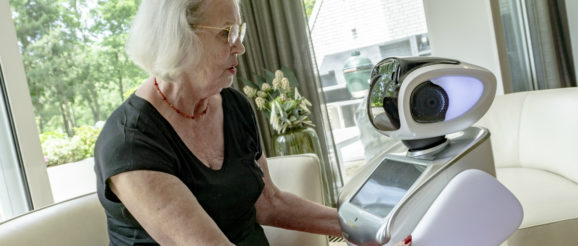Meet Sara at EIT Digital Innovation Day in Dec’19: The robot colleague that will offer elderly care in hospitals | Silicon Canals

According to the United Nations population data, Europe is home to the oldest population in the world. The report also says that one in four of all European are aged 60 and over. This ageing population presents numerous challenges for society as a whole.
Old-age dependency ratio in the EU increasing!
In another report from the European Commission, the total population in the EU is projected to increase to 520 million in 2070 from 511 million in 2016. However, the working-age population will decrease significantly to 292 million in 2070 from 333 million in 2016. Furthermore, the old-age dependency ratio in the EU is projected to increase by 21.6 percentage points, from 29.6% in 2016 to 51.2% in 2070.
3 out of 4 nurses experience high pressure and workload
The amount of old-aged people with (chronic) diseases is increasing while health authorities and hospitals facing staff shortages and heavy workloads. As a result, three out of four nurses are experiencing huge workload and high pressure, which in turn reflects in the poor quality of care and incidents such as medication errors.
“In this issue, it is necessary not only to continue to work harder but rather smarter,” said Emmy Rintjema, activity leader SARA Bright Cape.
Meet SARA!
Social & Autonomous Robotic health Assistant (SARA) is a smart robot that assists health care professionals in their daily tasks, including monitoring and maintaining client wellbeing. This smart robot offers specialised care, personal attention, and features modules for behaviour analysis and medication management too.
Pilot tests in Finland and the Netherlands!
The consortium of partners behind Sara, which, besides Bright Cape, includes Forum Virium Helsinki, GIM Robotics, Curamatik, and TU Berlin, is working to introduce robots as social entities in nursing homes and hospitals to improve the quality of care. At present, two pilot tests are currently ongoing in nursing homes in Finland and the Netherlands.
Designed to be autonomous
So far, the results of the pilot are incredibly positive, meaning, SARA has the potential to reduce the workload for health care professionals. Unlike other robots, SARA is designed to be mostly autonomous. When it comes to smart robots, feeding proper data is essential, and it is done through SARA Home.
Apart from reducing the workload, SARA can also interact with the patients, such as reading stories, showing films, reciting music, or playing word games. They can also interact with users and present them with simple exercises designed to improve their condition. “Mental and physical stimulation has a positive effect on delaying the dementia disease process.”
Primarily focuses on the Dutch healthcare market!
According to Rintjema, the positive experiences of these healthcare institutions lead to even more interest from other healthcare institutions. At present, SARA focuses primarily on the Dutch healthcare market and will be further expanded to Britain, Finland, and Germany. It’s worth mentioning that SARA is now mainly concentrated on taking care of the elderly. In the future, this can expand to hospital care.
So do you want to meet SARA? Well, you can interact with her at the EIT Digital Innovation Day in Eindhoven on 10 December. This vibrant event organised by Europe’s leading accelerator, EIT Digital will witness the presence of selected top-level European experts to offer fresh perspectives and insights and other on Deep Tech related topics. Further, the event will also include a vibrant keynote by Rob Creemers, presenting his vision on how technology has brought us to where we are today, and where it’s likely to lead us tomorrow. And also, they will be loads to inspirational talks, those interested should definitely register for it.
Image credits: SARA
Stay tuned to Silicon Canals for more European technology news.
